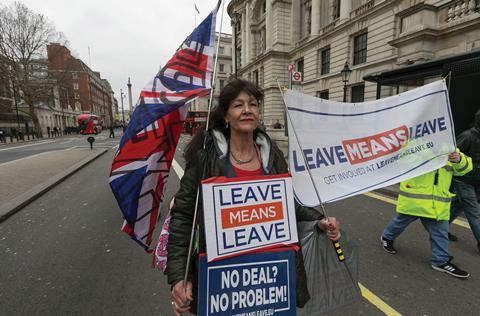As part of a special focus on Brexit: The no-deal implications for the legal sector.
Law touches everything – civil, criminal, family – and it also happens to be a multi-billion-pound sector which underpins all parts of the economy.

For many years now, thanks to our EU membership, our sector has enjoyed its own single market; with firms maintaining premises across European business hubs, individual practitioners flying in and out to appear in court or advise their clients, global contracts written in English law and disputes heard in English courts.
If we leave the EU without a deal, much of the certainty on which our economic growth is based will evaporate. We will have a prolonged and possibly never-ending period where we have to find workarounds when once there were clear rules and frameworks.
Big businesses and wealthy individuals may well weather many of these challenges because they can afford to litigate if a dispute turns toxic. But small and medium-sized enterprises – the courier firm in Essex which finds itself unpaid by the client in Lithuania – will no longer be able to seek redress in their local court knowing its decision will be enforced in the other jurisdiction. And a smaller business, operating on tight margins, is unlikely to be able run a court case in an overseas jurisdiction.
The much-heralded alternatives to EU trade have not materialised, either. As an EU member we are party to around 40 trade deals with more than 70 countries. The one with South Korea opened up opportunities for our law firms that are now in question.
As for new agreements, only a handful look like they might conclude. Even the trumpeted UK-Swiss agreement is not about a future trading relationship but rather divorce issues.

Meanwhile, access to other markets seems to be receding. Malaysia, Hong Kong, Russia and others are getting increasingly protectionist. Markets such as India seem as closed as ever they were.
And, of course, without a deal a whole raft of legal certainties, rules and recognitions borne of years of cooperation between member states will no longer exist – at least not for Britain. The package holiday directive; the European arrest warrant; pensions; rights over property; access to emergency healthcare; pet passports; the validity of your driving licence – these and many more issues will require individual attention.
That is even before we get on to the link between financial services and the law. Having moved the UK economy to such dependence on the City, there should be concern about the impact overnight exclusion from the EU27 will have. And I am not just talking about concern among those of us who make our crust in the City.
In October 2015, eight months before the Brexit vote, the Law Society published a report (The EU and the Legal Sector) which contained three key findings:
- Legal services would be disadvantaged disproportionately compared with the UK economy as a whole.
- The stronger negative effects on the legal services sector would be due to our sector’s reliance on sectors which are likely to be particularly hit by a UK withdrawal from the EU, particularly financial services and other professional services, and from the subsequent lower levels of business investment.
- The scale of the impact would depend on economic drivers shaped by the UK’s withdrawal negotiations and subsequent UK government policy actions.
So here we are, days from Brexit day, facing the possibility of no deal, no transition and looming negotiation with 27 EU countries to work our way through their national regulations and laws, where now we have one predictable set of criteria to deal with: the EU’s rules.
Of course, parties from around the world will continue to choose the law and jurisdiction of England and Wales so they can enjoy its stability, predictability and the good sense of our judiciary in their judgments. But as we look outwards, there may be many more hoops and challenges. While there may be a ‘bounce’ because people will need legal counsel to negotiate these complexities, if the wider economy shrinks because global business goes elsewhere, then so will our sector. Not to mention the obstacles that young talent will face in trying to access international legal careers.
What Brexit means for lawyers depends on what Brexit means. If we can come to terms that ensure we can still: practise across borders; support our businesses and citizens; recruit the best talent; and build on that tremendous global product of English law, then in time all will probably be well. If we leave without a deal, then who knows?
Simon Davis is vice president of the Law Society
Topics
Special focus Brexit: Standing alone

Deal or no deal, Brexit is set to greatly complicate the professional lives of lawyers and their clients. Kicking off a Gazette special focus, Marialuisa Taddia reports from a recent summit hosted by the Law Society and TheCityUK on what leaving the EU could mean for legal services
- 1
 Currently
reading
Currently
reading
No-deal would place our profession in peril
- 3
- 4
- 5








































4 Readers' comments